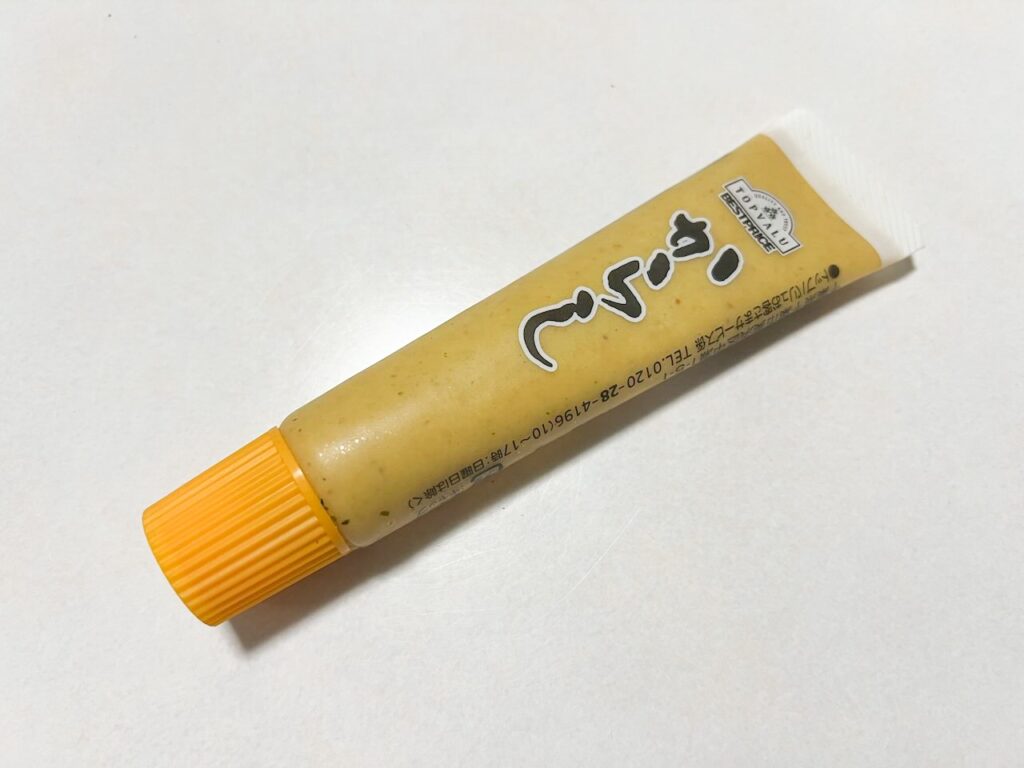While mustard appears in cuisines across the world, Japan’s version — known as karashi — holds a distinct place in the country’s culinary landscape. Intensely pungent, sharp, and nose-tingling, karashi offers a uniquely Japanese balance of heat and refinement.
In this guide, we’ll explore what sets Japanese mustard apart, its nutritional properties, how it’s made, its role in traditional dishes, and why moderation is key when enjoying its powerful flavor.
For a full overview of Japan’s rich condiment culture, visit:
👉 The Complete Guide to Japanese Condiments: Unlocking the Flavors Behind Japan’s Culinary Mastery
What Is Karashi?
Karashi is made from the ground seeds of brown mustard (Brassica juncea) or related mustard greens. Unlike Western mustards, which often include vinegar, wine, or sweeteners, traditional Japanese karashi is typically blended with just water, creating a pure, sharp, and intensely pungent paste.
Its signature sharpness comes from allyl isothiocyanate, the same compound responsible for the heat in wasabi and horseradish. Unlike chili peppers, karashi’s heat strikes the nose and quickly dissipates, making it well-suited for the light, clean flavors of Japanese cuisine.
👉 Karashi shares this pungent compound with another famous Japanese condiment.
Learn more about wasabi’s unique health benefits and cultural role here:
The Health Benefits and Nutritional Value of Wasabi: Precautions and Best Food Pairings
How Karashi Differs from Western Mustard
| Feature | Karashi (Japanese Mustard) | Western Mustard |
|---|---|---|
| Main Seeds | Brown mustard | White, black, or brown mustard |
| Flavor Profile | Pure, intense, nasal pungency | Spicy, tangy, sometimes acidic or sweet |
| Common Ingredients | Ground seeds, water | Vinegar, salt, sugar, wine, spices |
| Uses | Oden, natto, tonkatsu, shumai | Sandwiches, sausages, dressings, marinades |
Karashi’s simplicity allows it to complement the delicate balance of Japanese flavors without overpowering the core ingredients.
Traditional Uses of Karashi in Japanese Cuisine
In Japan, karashi plays a supporting but important role across many traditional foods:
- Oden: Served alongside this winter hot pot to add a sharp counterpoint to the mild broth.
- Natto: A common pairing with fermented soybeans, cutting through the stickiness with heat.
- Tonkatsu & Pork Dishes: A small dab enhances rich fried foods without overwhelming them.
- Shumai (Steamed Dumplings): Often paired with soy sauce and karashi as dipping sauce.
- Japanese-style sausages or ham: Occasionally paired much like Western mustard.
Like other Japanese condiments, karashi is applied sparingly — just enough to awaken the palate while respecting the natural flavors of the dish.
Nutritional Value of Karashi
Though usually consumed in very small amounts, karashi does contain a range of nutrients in its seed form:
- Protein and healthy fats
- Potassium, magnesium, calcium, iron, zinc, phosphorus
- Vitamins A, B1, B2, niacin
- Antioxidant compounds like glucosinolates
Typical nutritional values (per 100g, though servings are far smaller):
- Calories: 314 kcal
- Protein: 5.9 g
- Fat: 14.5 g
- Carbohydrates: 40.1 g
- Sodium: 2900 mg
- Calcium: 60 mg
- Iron: 2.1 mg
Since a normal serving is often less than 1 gram, karashi is not a major nutrient source. However, its antibacterial properties, digestive support, and metabolism-boosting effects are part of why it’s cherished in Japanese food culture.
Health Benefits and Cautions
Potential benefits:
- Aids digestion by stimulating saliva and gastric secretions.
- May offer mild antimicrobial properties.
- Contains antioxidant compounds that support overall wellness.
Why moderation matters:
Because of its intense pungency, consuming large quantities of karashi can cause:
- Stomach irritation (especially for individuals with ulcers, gastritis, or sensitive digestion).
- Digestive discomfort, including bloating or nausea.
- Interference with calcium absorption if overconsumed regularly.
As with many traditional Japanese condiments, a little goes a long way.
Karashi’s Cultural Role in Japan
Karashi reflects several core values of Japanese cuisine:
- Balance over excess: Used sparingly to enhance, not dominate.
- Purity of preparation: Minimal ingredients allow the mustard’s true flavor to shine.
- Respect for seasonal and regional foods: Karashi pairs with both winter dishes like oden and daily staples like natto.
In this way, karashi is not just a condiment but an expression of Japan’s broader food philosophy: simplicity, balance, and harmony with nature.
Conclusion
Karashi may seem like a simple condiment, but within its sharp, fleeting heat lies centuries of culinary tradition. Whether paired with warming oden in winter or a bowl of natto for breakfast, karashi reflects the precise, mindful seasoning that defines Japanese food culture.
By appreciating its power in small amounts, you can enjoy both the flavor and healthful qualities of this distinctive Japanese mustard.


